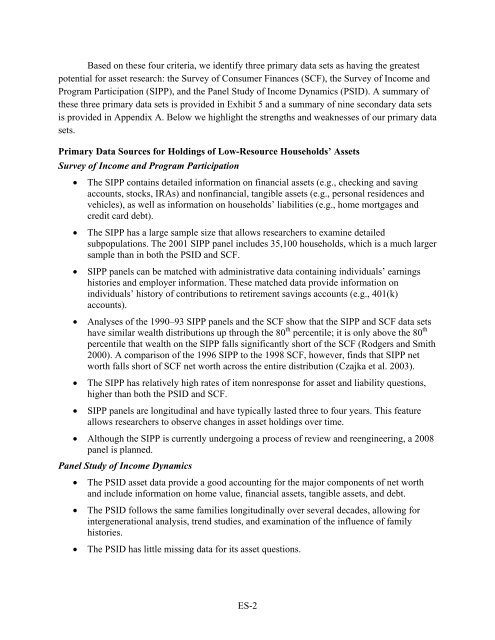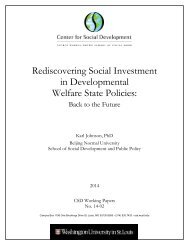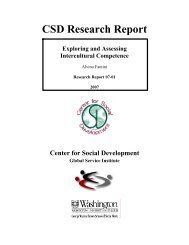Assessing Asset Data on Low-Income Households - Urban Institute
Assessing Asset Data on Low-Income Households - Urban Institute
Assessing Asset Data on Low-Income Households - Urban Institute
Create successful ePaper yourself
Turn your PDF publications into a flip-book with our unique Google optimized e-Paper software.
Based <strong>on</strong> these four criteria, we identify three primary data sets as having the greatest<br />
potential for asset research: the Survey of C<strong>on</strong>sumer Finances (SCF), the Survey of <strong>Income</strong> and<br />
Program Participati<strong>on</strong> (SIPP), and the Panel Study of <strong>Income</strong> Dynamics (PSID). A summary of<br />
these three primary data sets is provided in Exhibit 5 and a summary of nine sec<strong>on</strong>dary data sets<br />
is provided in Appendix A. Below we highlight the strengths and weaknesses of our primary data<br />
sets.<br />
Primary <str<strong>on</strong>g>Data</str<strong>on</strong>g> Sources for Holdings of <strong>Low</strong>-Resource <strong>Households</strong>’ <str<strong>on</strong>g>Asset</str<strong>on</strong>g>s<br />
Survey of <strong>Income</strong> and Program Participati<strong>on</strong><br />
• The SIPP c<strong>on</strong>tains detailed informati<strong>on</strong> <strong>on</strong> financial assets (e.g., checking and saving<br />
accounts, stocks, IRAs) and n<strong>on</strong>financial, tangible assets (e.g., pers<strong>on</strong>al residences and<br />
vehicles), as well as informati<strong>on</strong> <strong>on</strong> households’ liabilities (e.g., home mortgages and<br />
credit card debt).<br />
• The SIPP has a large sample size that allows researchers to examine detailed<br />
subpopulati<strong>on</strong>s. The 2001 SIPP panel includes 35,100 households, which is a much larger<br />
sample than in both the PSID and SCF.<br />
• SIPP panels can be matched with administrative data c<strong>on</strong>taining individuals’ earnings<br />
histories and employer informati<strong>on</strong>. These matched data provide informati<strong>on</strong> <strong>on</strong><br />
individuals’ history of c<strong>on</strong>tributi<strong>on</strong>s to retirement savings accounts (e.g., 401(k)<br />
accounts).<br />
• Analyses of the 1990–93 SIPP panels and the SCF show that the SIPP and SCF data sets<br />
have similar wealth distributi<strong>on</strong>s up through the 80 th percentile; it is <strong>on</strong>ly above the 80 th<br />
percentile that wealth <strong>on</strong> the SIPP falls significantly short of the SCF (Rodgers and Smith<br />
2000). A comparis<strong>on</strong> of the 1996 SIPP to the 1998 SCF, however, finds that SIPP net<br />
worth falls short of SCF net worth across the entire distributi<strong>on</strong> (Czajka et al. 2003).<br />
• The SIPP has relatively high rates of item n<strong>on</strong>resp<strong>on</strong>se for asset and liability questi<strong>on</strong>s,<br />
higher than both the PSID and SCF.<br />
• SIPP panels are l<strong>on</strong>gitudinal and have typically lasted three to four years. This feature<br />
allows researchers to observe changes in asset holdings over time.<br />
• Although the SIPP is currently undergoing a process of review and reengineering, a 2008<br />
panel is planned.<br />
Panel Study of <strong>Income</strong> Dynamics<br />
• The PSID asset data provide a good accounting for the major comp<strong>on</strong>ents of net worth<br />
and include informati<strong>on</strong> <strong>on</strong> home value, financial assets, tangible assets, and debt.<br />
• The PSID follows the same families l<strong>on</strong>gitudinally over several decades, allowing for<br />
intergenerati<strong>on</strong>al analysis, trend studies, and examinati<strong>on</strong> of the influence of family<br />
histories.<br />
• The PSID has little missing data for its asset questi<strong>on</strong>s.<br />
ES-2
















